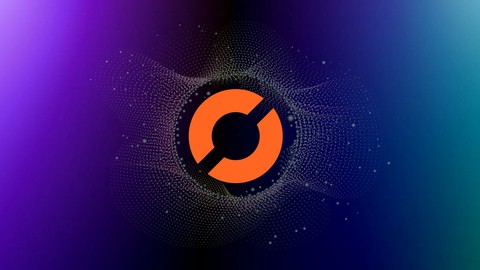
Multiuser Python Jupyter Notebooks for Gen AI, ML & DS
Multiuser Python Jupyter Notebooks for Gen AI, ML & DS, available at Free, has an average rating of 4.75, with 11 lectures, based on 2 reviews, and has 1116 subscribers.
You will learn about Harness the collaborative power of Python Jupyter Notebooks for generative AI, ML, and data science projects. Set up and manage multiuser environments using JupyterHub on cloud platforms like AWS, GCP, and Azure. Deploy Jupyter Notebooks on AWS, GCP, and Azure, enabling seamless collaboration with team members. Enable ChatUI within Jupyter environments for real-time communication and collaboration. Utilize magic commands to enhance productivity and efficiency in Jupyter Notebooks. Secure JupyterHub deployments with HTTPS encryption to protect sensitive data. Install and manage additional Python packages and dependencies within Jupyter Notebooks. Gain hands-on experience through practical demonstrations, interactive exercises, and immersive lectures. This course is ideal for individuals who are Data scientists, machine learning engineers, and AI practitioners seeking to enhance collaboration and productivity in their projects. or Professionals interested in exploring the collaborative capabilities of Python Jupyter Notebooks for generative AI, ML, and data science. or Team leads or project managers aiming to facilitate teamwork and innovation within their organizations by leveraging JupyterHub for multiuser environments. or Students or enthusiasts eager to delve into the dynamic realm of generative AI, ML, and data science collaboration using cutting-edge tools and technologies like Jupyter Notebooks and JupyterHub. It is particularly useful for Data scientists, machine learning engineers, and AI practitioners seeking to enhance collaboration and productivity in their projects. or Professionals interested in exploring the collaborative capabilities of Python Jupyter Notebooks for generative AI, ML, and data science. or Team leads or project managers aiming to facilitate teamwork and innovation within their organizations by leveraging JupyterHub for multiuser environments. or Students or enthusiasts eager to delve into the dynamic realm of generative AI, ML, and data science collaboration using cutting-edge tools and technologies like Jupyter Notebooks and JupyterHub.
Enroll now: Multiuser Python Jupyter Notebooks for Gen AI, ML & DS
Summary
Title: Multiuser Python Jupyter Notebooks for Gen AI, ML & DS
Price: Free
Average Rating: 4.75
Number of Lectures: 11
Number of Published Lectures: 11
Number of Curriculum Items: 11
Number of Published Curriculum Objects: 11
Original Price: Free
Quality Status: approved
Status: Live
What You Will Learn
- Harness the collaborative power of Python Jupyter Notebooks for generative AI, ML, and data science projects.
- Set up and manage multiuser environments using JupyterHub on cloud platforms like AWS, GCP, and Azure.
- Deploy Jupyter Notebooks on AWS, GCP, and Azure, enabling seamless collaboration with team members.
- Enable ChatUI within Jupyter environments for real-time communication and collaboration.
- Utilize magic commands to enhance productivity and efficiency in Jupyter Notebooks.
- Secure JupyterHub deployments with HTTPS encryption to protect sensitive data.
- Install and manage additional Python packages and dependencies within Jupyter Notebooks.
- Gain hands-on experience through practical demonstrations, interactive exercises, and immersive lectures.
Who Should Attend
- Data scientists, machine learning engineers, and AI practitioners seeking to enhance collaboration and productivity in their projects.
- Professionals interested in exploring the collaborative capabilities of Python Jupyter Notebooks for generative AI, ML, and data science.
- Team leads or project managers aiming to facilitate teamwork and innovation within their organizations by leveraging JupyterHub for multiuser environments.
- Students or enthusiasts eager to delve into the dynamic realm of generative AI, ML, and data science collaboration using cutting-edge tools and technologies like Jupyter Notebooks and JupyterHub.
Target Audiences
- Data scientists, machine learning engineers, and AI practitioners seeking to enhance collaboration and productivity in their projects.
- Professionals interested in exploring the collaborative capabilities of Python Jupyter Notebooks for generative AI, ML, and data science.
- Team leads or project managers aiming to facilitate teamwork and innovation within their organizations by leveraging JupyterHub for multiuser environments.
- Students or enthusiasts eager to delve into the dynamic realm of generative AI, ML, and data science collaboration using cutting-edge tools and technologies like Jupyter Notebooks and JupyterHub.
This comprehensive course equips participants with essential skills to harness the collaborative power of Python Jupyter Notebooks for generative AI, machine learning (ML), and data science projects. Through immersive hands-on exercises and practical demonstrations, learners navigate the dynamic realm of Jupyter Notebooks, gaining mastery over collaborative workflows and innovative techniques.
The course begins with an overview of its structure, objectives, and expected outcomes, emphasizing the importance of collaborative environments in data-driven projects. Participants delve into the core concepts and functionalities of Jupyter Notebooks in the context of generative AI, exploring intuitive interfaces and configurations tailored for AI applications.
Practical sessions guide participants through the setup and configuration of Jupyter Notebooks on cloud platforms such as AWS, GCP, and Azure, enabling seamless collaboration with team members. Advanced topics include enabling multiuser environments using JupyterHub, integrating ChatUI for real-time communication, and leveraging magic commands to enhance productivity.
Participants learn to secure JupyterHub deployments with HTTPS encryption, protecting sensitive data from unauthorized access. Additionally, they gain proficiency in installing and managing additional Python packages and dependencies within Jupyter Notebooks, extending the functionality of their environments.
By the course’s conclusion, participants have acquired profound insights and practical skills essential for navigating the complex landscape of data-driven innovation. Whether data scientists, machine learning engineers, project managers, or enthusiasts, learners emerge ready to leverage Python Jupyter Notebooks for collaborative AI, ML, and data science projects.
Course Curriculum
Chapter 1: Introduction
Lecture 1: Jupyter AI Python Notebook Course Overview and Objectives
Lecture 2: Overview of Generative AI and LLM Capabilities in Jupyter
Lecture 3: Part 1: Setup and installation of Jupyter Python Notebook on AWS cloud on CPU VM
Lecture 4: Part 1: Setup and installation of Jupyter Python Notebook on GCP cloud on CPU VM
Lecture 5: Part 2: Setup and installation of Jupyter Python Notebook on GCP cloud on GPU VM
Lecture 6: Part 1: Setup of Jupyter Python Notebook on Azure cloud on CPU VM
Lecture 7: Part 2: Setup of Jupyter Python Notebook on Azure cloud on GPU VM
Lecture 8: 06 – Enable Multiuser Environment in Jupyter AI
Lecture 9: 07 – ChatUI in Jupyter for Generative AI & LLMs
Lecture 10: 08 – Magic Commands in Jupyter AI
Lecture 11: Enabling HTTPS for JupyterHub
Instructors
-
TechLatest .Net
Training videos on latest technologies and trends
Rating Distribution
- 1 stars: 0 votes
- 2 stars: 0 votes
- 3 stars: 0 votes
- 4 stars: 1 votes
- 5 stars: 1 votes
Frequently Asked Questions
How long do I have access to the course materials?
You can view and review the lecture materials indefinitely, like an on-demand channel.
Can I take my courses with me wherever I go?
Definitely! If you have an internet connection, courses on Udemy are available on any device at any time. If you don’t have an internet connection, some instructors also let their students download course lectures. That’s up to the instructor though, so make sure you get on their good side!
You may also like
- Best Software Testing Courses to Learn in December 2024
- Best Big Data Courses to Learn in December 2024
- Best Internet Of Things Courses to Learn in December 2024
- Best Quantum Computing Courses to Learn in December 2024
- Best Cloud Computing Courses to Learn in December 2024
- Best 3d Modeling Courses to Learn in December 2024
- Best Mobile App Development Courses to Learn in December 2024
- Best Graphic Design Courses to Learn in December 2024
- Best Videography Courses to Learn in December 2024
- Best Photography Courses to Learn in December 2024
- Best Language Learning Courses to Learn in December 2024
- Best Product Management Courses to Learn in December 2024
- Best Investing Courses to Learn in December 2024
- Best Personal Finance Courses to Learn in December 2024
- Best Health And Wellness Courses to Learn in December 2024
- Best Chatgpt And Ai Tools Courses to Learn in December 2024
- Best Virtual Reality Courses to Learn in December 2024
- Best Augmented Reality Courses to Learn in December 2024
- Best Blockchain Development Courses to Learn in December 2024
- Best Unity Game Development Courses to Learn in December 2024





















